
Anyone who feels passionate about their career wants to climb the ladder of success — sooner rather than later. This principle remains true regardless of the career path and industry. Today, we’ll learn what it takes to become a senior engineer.
Table of Contents
- What Is a Senior Engineer?
- What Does a Senior Engineer Do?
- Senior Engineer Skills
- How Much Does a Senior Engineer Make?
- Senior Engineer Career Paths
- How to Become a Senior Engineer
- 11 Career Tips for Engineers
- Becoming a Senior Engineer: FAQ
- Senior Engineer Positions at Danaher
Like other high-ranking positions, the longer someone works in an industry, the higher their chances of advancing to a senior position. Higher positions generally come with increased responsibilities — from managing projects to managing people. That in itself may seem challenging, but it’s also gratifying to see the real-world impacts of the work.
Throughout this guide, we’ll explore various factors that play a role in the journey to seniority. We’ll outline the key responsibilities, qualifications, experience and practical steps individuals can take to become senior engineers. While career advancement may seem daunting, achieving this milestone with proper guidance and knowledge becomes attainable!
Let’s start this journey and pave the way for a fulfilling and impactful career in engineering.
What Is a Senior Engineer?
A senior engineer is a seasoned professional with a wealth of experience and expertise. Unlike junior or mid-level engineers, senior engineers possess a deep understanding of engineering principles and practices, honed through years of hands-on work and problem-solving.
Staff Engineers vs. Senior Engineers
One key difference between senior engineers and staff engineers lies in the level of experience and responsibility. While staff engineers may have proficient technical skills, senior engineers take on more of a leadership role and provide guidance and mentorship to junior team members.
Additionally, senior engineers have a broader scope of responsibilities than staff engineers. They handle engineering tasks and take on strategic planning and project management. They help shape the direction of projects, ensuring their successful execution — from conception to completion.
Another notable difference involves the level of autonomy and decision-making authority. Senior engineers make crucial decisions independently, drawing on their expertise and judgment to navigate complex challenges. In contrast, staff engineers may work under closer supervision and guidance, with less autonomy in decision-making.
What Does a Senior Engineer Do?
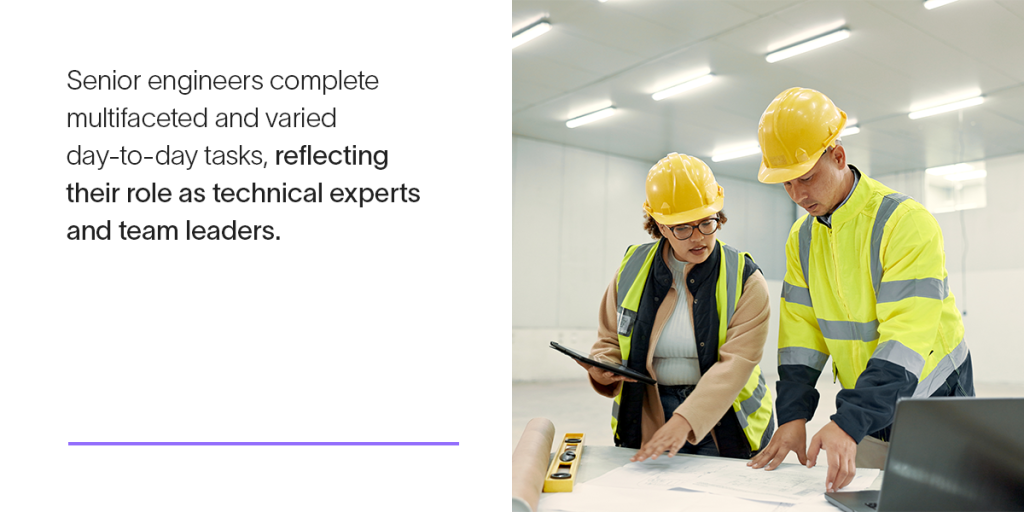
Senior engineers complete multifaceted and varied day-to-day tasks, reflecting their role as technical experts and team leaders. Job description and primary duties of a senior engineer often include the following:
- Oversee projects: Senior engineers supervise and manage projects from beginning to end. This process involves coordinating with team members, setting project goals and meeting timelines and budgets.
- Provide technical guidance: As seniors, these individuals serve as technical experts, offering guidance and support to junior engineers. They use their expertise to solve complex engineering problems and provide direction on technical matters.
- Manage design plans: Senior engineers oversee the development and implementation of design plans for engineering projects. They ensure that designs meet specifications, comply with regulations and achieve desired outcomes.
- Liaise with clients: Individuals in these positions often act as clients’ primary point of contact, representing their organizations in meetings and negotiations. They work closely with clients to understand their needs, communicate project progress and address concerns.
- Budget management: Senior engineers manage project budgets, allocate resources effectively and control costs. They must ensure that projects get completed within budget constraints while maintaining high-quality standards.
- Assist with employee onboarding: Senior engineers play a role in onboarding new employees, providing training, mentorship and guidance to help them integrate into the team smoothly.
- Conduct research: Those in these positions conduct in-depth research to inform engineering projects and decision-making. Research may involve analyzing data, evaluating technologies and staying abreast of industry trends and best practices.
- Provide process recommendations: Senior engineers identify opportunities for process improvement within their organizations and develop recommendations to enhance efficiency and productivity.
- Negotiate contracts: Senior engineers may negotiate contracts with vendors, subcontractors and other stakeholders. They ensure that contractual agreements align with project requirements and objectives.
- Present findings: Senior engineers often present their findings, recommendations and project updates to internal teams, clients and stakeholders. Effective communication assists with conveying complex technical information clearly and understandably.
- Supervise team members: Senior engineers supervise and mentor junior team members, providing guidance, feedback and support to help them grow and develop in their roles. They foster a collaborative and supportive work environment where team members can thrive.
Senior Engineer Skills
Becoming a senior engineer requires hard and soft skills.
Hard Skills
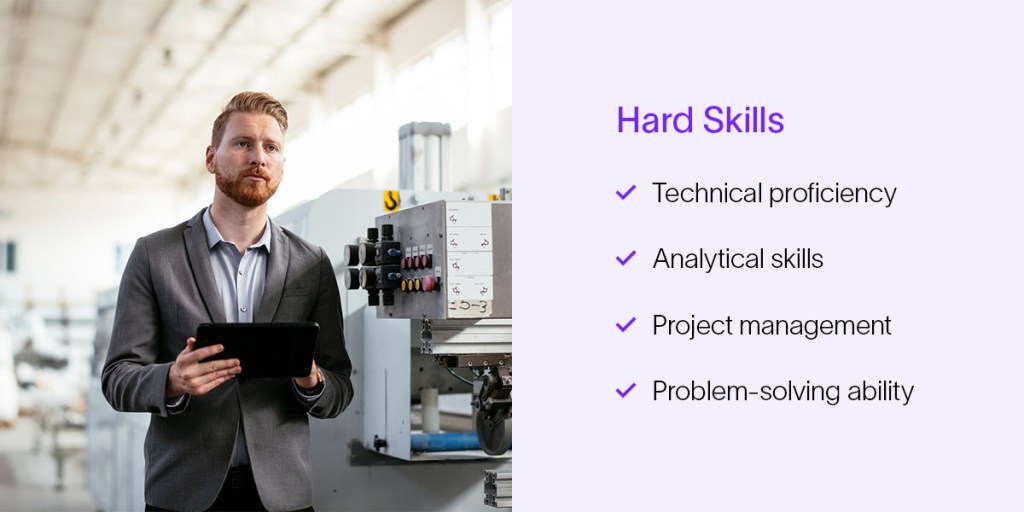
Focusing on these specific hard skills may enable individuals to set themselves up for success in a senior engineering role:
- Technical proficiency: Engineers must have advanced technical knowledge and proficiency in a particular field of engineering. These may include expertise in relevant software, tools and methodologies.
- Analytical skills: Strong analytical skills help individuals assess complex engineering problems, identify viable solutions and make data-driven decisions. Senior engineers must be able to analyze data, interpret results and draw meaningful conclusions.
- Project management: Senior engineers often manage multiple projects simultaneously. They must have excellent project management skills, including the ability to plan, organize and execute projects effectively while meeting deadlines and budget constraints.
- Problem-solving ability: Senior engineers must be adept problem solvers capable of tackling challenging engineering issues and finding innovative solutions. They must approach problems methodically, consider various alternatives and implement effective solutions.
Soft Skills
Soft skills may hold equal or greater value than hard skills. Developing the following skill set may assist applicants in engaging with both clients and colleagues:
- Leadership: Senior engineers must demonstrate leadership skills, like inspiring and motivating team members, delegating tasks and providing guidance and direction. They must foster a collaborative and inclusive work environment where team members feel empowered to contribute their best.
- Communication: Effective communication helps senior engineers convey complex technical information clearly and concisely to various stakeholders, including clients, team members and senior management. They must be able to articulate ideas, present findings and facilitate productive discussions.
- Teamwork: Senior engineers work collaboratively with multidisciplinary teams to achieve project objectives. They must work effectively in a team environment, collaborate with colleagues from varied backgrounds and leverage collective expertise to drive project success.
- Adaptability: The engineering landscape constantly evolves, and senior engineers must be adaptable and open to change. They must navigate uncertainty, embrace new technologies and methodologies and pivot quickly in response to evolving project requirements.
How Much Does a Senior Engineer Make?

While salaries vary based on location, industry and level of experience, senior engineers typically command competitive compensation packages.
According to Indeed, the salary range for senior engineers in the United States falls between $88,000 and over $202,000 annually. Base salaries average around $133,000. However, these figures can fluctuate based on factors such as the engineer’s specialization, level of expertise and geographic location.
Bonuses and Benefits
In addition to base salaries, senior engineers often enjoy various financial benefits and incentives. These may include performance-based bonuses, profit-sharing opportunities, stock options, comprehensive health care packages and retirement benefits. Some organizations also offer perks like flexible work schedules, remote work options and professional development stipends to support ongoing learning and skill enhancement.
Senior engineers may negotiate additional compensation components, such as relocation assistance, signing bonuses and annual salary reviews. As they progress in their careers and accumulate more experience and expertise, senior engineers can leverage their skills and achievements to secure increasingly attractive compensation packages.
Aspiring senior engineers should also weigh other factors — such as job satisfaction, career growth opportunities and work-life balance — when evaluating their career paths.
Senior Engineer Career Paths
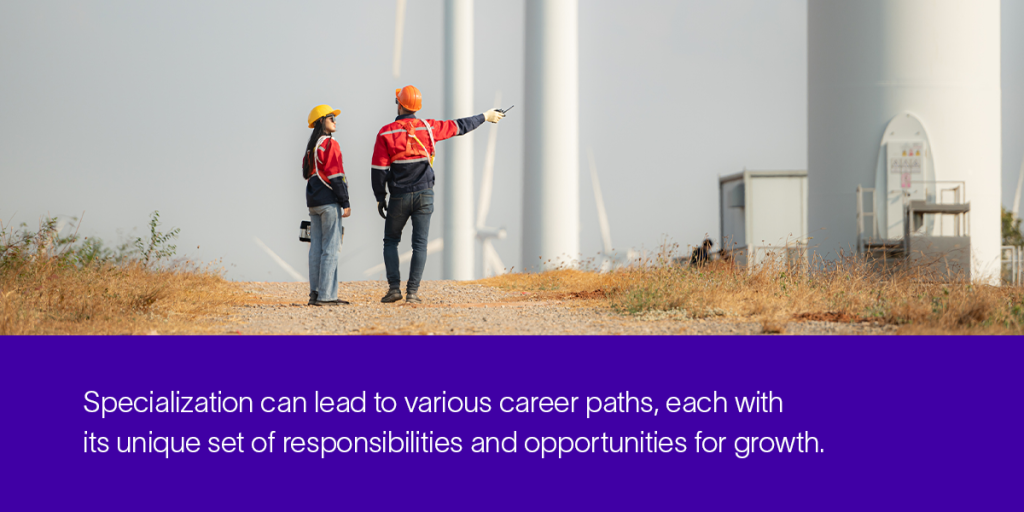
As engineers progress in their careers, they often have the opportunity to specialize in specific areas. This specialization can lead to various career paths, each with its unique set of responsibilities and opportunities for growth.
Let’s explore some common career paths for senior engineers:
- Senior design engineer: These engineers oversee the design process of complex engineering projects. They collaborate with multidisciplinary teams to develop innovative solutions and ensure that designs meet technical specifications and regulatory requirements. Senior design engineers may specialize in civil, mechanical, electrical or software engineering.
- Senior network engineer: Senior network engineers design, implement and maintain computer networks for organizations. They ensure that networks operate efficiently and securely. These engineers often lead network architecture projects and provide technical guidance to junior engineers.
- Senior electrical engineer: Senior electrical engineers specialize in designing, developing and testing electrical systems and components. They may work on projects ranging from power distribution and control systems to electronic devices and circuits. Senior electrical engineers often lead the electrical design phase of large-scale projects and provide technical support to project teams.
- Senior project engineer: Senior project engineers oversee the planning, execution and completion of engineering projects. They coordinate project activities, manage resources and ensure that projects get delivered on time and within budget. They may specialize in areas such as construction, manufacturing or infrastructure projects.
- Senior software engineer: Senior software engineers develop and maintain software applications, systems and platforms. Proficient in programming languages and software development methodologies, they collaborate with cross-functional teams to deliver high-quality software solutions. Senior software engineers may specialize in web development, mobile applications or embedded systems.
- Senior mechanical engineer: Senior mechanical engineers design and analyze mechanical systems and components, such as engines, machinery and equipment. They use computer-aided design (CAD) software and simulation tools to optimize designs and ensure functionality and reliability. Senior mechanical engineers may specialize in HVAC, aerospace or automotive engineering.
How to Become a Senior Engineer

While the journey to seniority may vary depending on individual circumstances and career paths, aspiring engineers can take several steps to progress from entry-level or intermediate positions to senior roles.
Here’s a step-by-step guide on how to become a senior engineer.
1. Explore Education
A senior engineer usually requires a bachelor’s degree in electrical engineering, mechanical engineering, computer science, civil engineering or business. A strong educational foundation helps engineers understand fundamental engineering principles and concepts. Additionally, individuals should consider pursuing advanced degrees or specialized certifications. These additional accreditations can deepen knowledge and expertise in specific areas of engineering.
2. Develop Skills
Candidates should focus on developing hard and soft skills essential for success as a senior engineer. Technical skills may include proficiency in engineering software, problem-solving abilities and project management expertise. Soft skills such as communication, leadership and teamwork also help senior engineers effectively collaborate with colleagues and lead engineering projects.
3. Complete Relevant Training
Applicants can participate in training programs, workshops and seminars to stay updated on the latest advancements and best practices in engineering. Aspiring senior engineers should seek opportunities to enhance their technical skills and learn new tools and technologies relevant to their area of expertise.
4. Research Duties

Gaining a comprehensive understanding of the duties and responsibilities associated with senior engineering roles may help applicants get the job. Candidates should research industry trends, job descriptions and career pathways to identify the skills and qualifications required for senior-level positions. This knowledge can help align career goals and development efforts accordingly.
5. Get Experience
Aspiring senior engineers must seek opportunities to gain relevant experience. They can work on challenging projects, collaborate with experienced engineers and take on leadership roles to demonstrate their potential as a future senior engineer. It may take a few years to become a senior engineer and gain relevant experience.
6. Prepare a Resume
Once an aspiring senior engineer has gained a solid background, they can prepare their resume. Applicants should craft a professional resume highlighting their education, skills and work experience relevant to the senior engineering role. A tailor-made resume should also emphasize accomplishments, leadership experiences and contributions to engineering projects. All applicants should be sure to include any certifications, awards or publications demonstrating relevant expertise and dedication to the field.
7. Apply for Jobs
Once confident enough, aspiring senior engineers can apply for positions that align with their career goals and interests. Additionally, it’s equally important to network with industry professionals, attend career fairs and leverage online job search platforms to explore job opportunities and connect with potential employers.
11 Career Tips for Engineers
These valuable career tips can help guide aspiring senior engineers along the way:
- Find teaching opportunities: Aspiring senior engineers should embrace opportunities to share knowledge and expertise with others. Whether hosting lunch and learns, speaking at industry events or mentoring junior engineers, teaching can help solidify an individual’s understanding of engineering concepts while enhancing leadership skills.
- Ask the right questions: When faced with new challenges or considering a senior engineering role, aspiring senior engineers shouldn’t hesitate to ask pertinent questions. They can seek clarification on responsibilities, expectations and career progression paths to make informed decisions about professional development.
- Document learnings: Applicants should record experiences, insights and lessons learned throughout their engineering career. Documenting these learnings makes a valuable reference for personal growth and enables sharing knowledge with colleagues and mentees.
- Remain curious: People in any field should stay curious and open-minded about emerging technologies, industry trends and innovative solutions. Continuous learning and exploration help engineers adapt to change and stay ahead in a rapidly evolving industry.
- Find a mentor: Looking for guidance from experienced engineers who can offer valuable insights and advice based on their career journeys can help aspiring senior engineers. Mentors provide valuable support, encouragement and perspective as they navigate their paths to senior engineering roles.
- Think strategically: Candidates will want to develop strategic thinking skills to analyze complex problems, anticipate future challenges and plan for long-term success. They should consider the broader implications of engineering decisions and how they align with organizational goals and objectives.
- Master technical tools: Engineers must stay proficient in technical tools and software. Whether it’s CAD software, data analysis tools or programming languages, mastering technical tools helps execute engineering projects and mentor junior engineers.
- Create better workflows: Senior engineers look for opportunities to streamline workflows, automate processes and improve project efficiency. They aim to maximize productivity and focus on high-impact tasks by optimizing workflows and eliminating inefficiencies.
- Accept new challenges: Engineers embrace new challenges as they arise. Taking on new projects, responsibilities and roles helps inspire personal and professional growth as an engineer.
- Provide and ask for feedback: Another goal involves fostering a culture of constructive feedback within the team and organization. Senior engineers offer feedback to colleagues to help them improve and grow, and they don’t hesitate to seek feedback on their performance to identify areas for development.
- Communicate clearly: Effective communication is vital to success in any engineering role. Senior engineers practice clear and concise communication with team members, stakeholders and clients to ensure everyone remains aligned and informed.
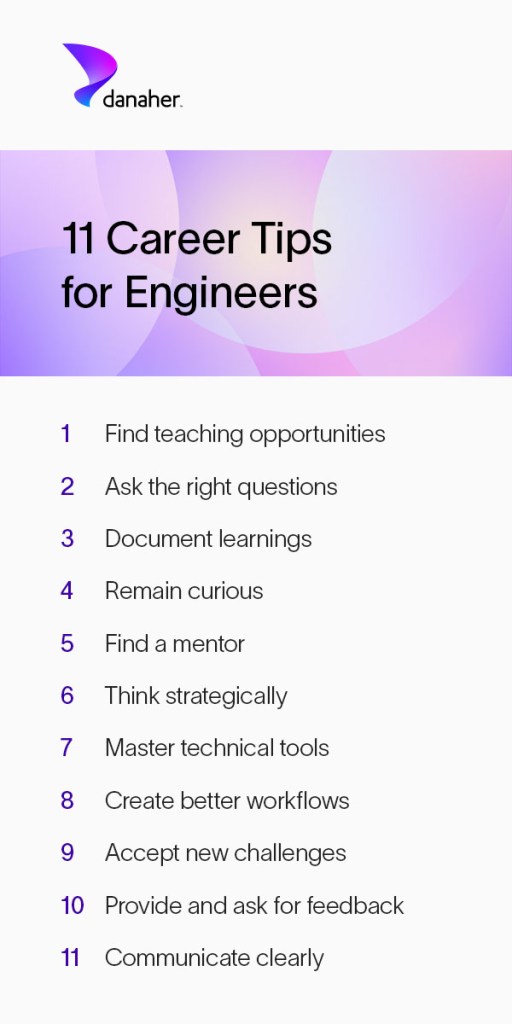
Becoming a Senior Engineer: FAQ
Consider the answers to these frequently asked questions for extra clarity and guidance.
1. How Many Years Does It Take to Become a Senior Engineer?
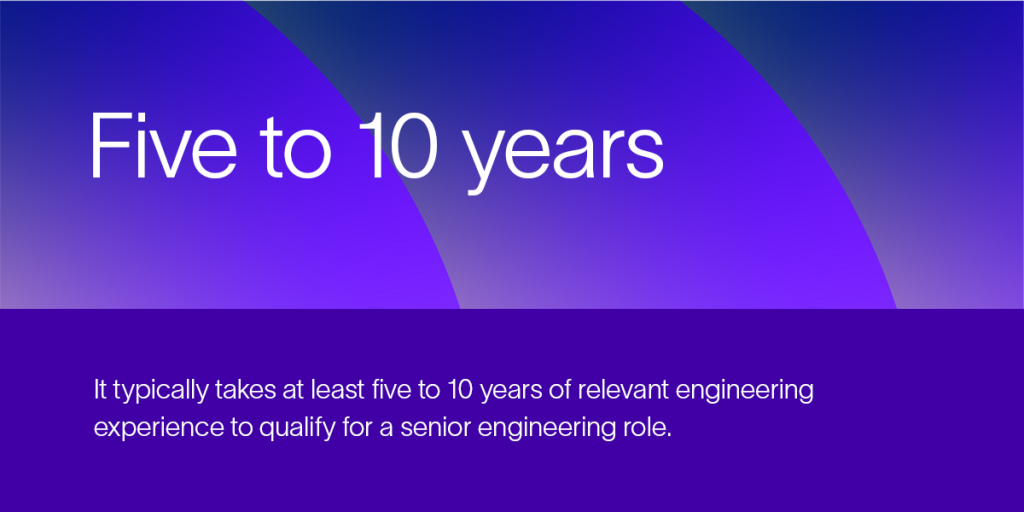
The timeline to becoming a senior engineer varies depending on education, experience and professional development. It typically takes at least five to 10 years of relevant engineering experience to qualify for a senior engineering role. However, this timeframe may be shorter for individuals with advanced degrees or specialized expertise. Candidates should focus on continuous learning, skill development and gaining practical experience.
2. What Qualifications Do Applicants Need to Become a Senior Engineer?
Individuals looking to become senior engineers usually need a bachelor’s degree in engineering or a related field from an accredited institution. Additionally, they should have several years of relevant engineering experience that demonstrates a thorough understanding of engineering principles and practices. Advanced degrees or professional certifications may enhance an aspiring senior engineer’s qualifications and credibility.
3. How Can Candidates Stand Out When Applying for Senior Engineering Roles?
To stand out as a candidate for senior engineering roles:
- Focus on developing a diversified skill set, including hard and soft skills.
- Demonstrate strong leadership abilities, problem-solving skills and the capacity to manage complex projects effectively.
- Seek opportunities for professional development, such as training programs, certifications and leadership roles within professional organizations.
Aspiring senior engineers can also showcase their accomplishments and contributions through a well-crafted resume and professional networking.
4. What Do the Key Responsibilities of a Senior Engineer Include?
Senior engineers typically oversee projects, provide technical guidance and mentorship to junior engineers and contribute to strategic decision-making within their organization. They may be involved in project planning, design and implementation, budget management, client liaison and team leadership. Additionally, senior engineers must stay abreast of industry trends, regulations and best practices to ensure the success of engineering projects.
Take Your Engineering Career to the Next Level With Danaher
Congratulations on taking the first step toward advancing your engineering career to the senior level! Becoming a senior engineer opens doors to exciting opportunities for leadership, innovation and professional growth.
At Danaher, we’re committed to accelerating the power of science and technology to improve human health and drive positive change in the world. As a global leader in life sciences and diagnostics innovation, we offer a dynamic and supportive environment where talented engineers like you can thrive and make a meaningful impact.
Explore senior engineer positions at Danaher to join a team dedicated to pushing the boundaries of what’s possible. With our culture of continuous improvement and a commitment to career development, you’ll have the resources and support you need to succeed.


Leave a Reply